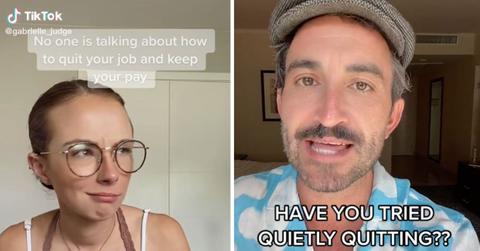Zoomers and Millennials are "Quiet Quitting" by Doing the Bare Minimum at Work
Updated July 8 2023, 9:39 a.m. ET

In 2013, pop queen and boss babe Britney Spears iconically taught us in her anthem "Work B----," that if you want a hot body, a Lamborghini, and to party in France (among other extravagances), then you better "get to work, b----."
And you know what? We did just that. We buckled down and bought gaudy notebooks and mugs inscribed with futile phrases like “conquer today” and “goal digger.” We started posting frequently on LinkedIn and paged through career handbooks in our downtime.
Basically, we were doing our jobs and then some. And guess what happened? Many of us worked until we went berserk. The term "burnout" came into the mix — although it wasn't taken seriously until 2019 when the World Health Organization (WHO) confirmed that it was in fact a legitimate thing.
Burnout is defined by WHO as a "syndrome conceptualized as resulting from chronic workplace stress that has not been successfully managed," and is characterized by three major symptoms. These include feelings of energy depletion or exhaustion, increased mental distance from one’s job or negative feelings towards one’s career, and reduced professional productivity.

What followed was the Great Resignation of 2021, in which a record number of folks left their jobs. Per a survey from Pew Research Center, low pay, a lack of opportunities for advancement, and feeling disrespected in the workplace were some of the leading factors for why people quit.
Now there's a new workplace trend popping up. Here's everything we know about the latest phenomenon: “quiet quitting.”
What is "quiet quitting?"
Search #quietquitting on TikTok and you'll see that the hashtag has accumulated over 3.7 million views as of this writing. As the abundance of videos claims, quiet quitting or quietly quitting refers to the act of taking a step back at your job and doing the bare minimum.
Despite its name, it has nothing to do with leaving a position, but instead, advises folks to cut back their efforts at work and only do what is listed in their job description.
For example, this might mean saying "no" to extra projects, spending less time on assignments, leaving right as the clock strikes 5 p.m., or spending less time overanalyzing every message your boss sends you on Slack, among other things.
Spearheading this trend on the platform are overworked millennials and Gen Zers who feel that overextending themselves at work is no longer worth it. But don't be fooled — this new fad is not an excuse to slack off.
Josh Bittinger, who works at a management consulting company, told The Wall Street Journal that quiet quitting is viewed more as an effective way to avoid burnout. And after years of saying “yes” to everything in hopes of impressing his boss, he's learned to say "no" more for the sake of his own sanity.
Furthermore, as TikTok creator Clayton Farris says in his clip below, quietly quitting his job has done wonders for his mental health. “The most interesting part about it is nothing’s changed. I still work just as hard. I still get just as much accomplished. I just don’t stress and internally rip myself to shreds," he explained.
Not everyone is a fan of "quiet quitting" on TikTok.
While quiet quitting is meant to be a positive practice in which workers prioritize their own well-being, there are some folks who aren't really on board with it.
As creator Stephanie Perry said in a video, "Quiet quitting does not work for Black women."
She explained: "In the United States, people are taught from a very young age to heavily lean on Black women for labor and for support. And Black women and Black girls internalize this and are no longer able to reject that in spaces where people will lean on that."
In other words, Black women have been bearing the brunt at work for years and cannot just unlearn that. Not to mention, that they may face repercussions for doing so.
Furthermore, as creator Emily Smith says in her video, quietly quitting may not always be the most effective solution. She argues that your boss may not actually be aware of how extensive your workload is and why you're so stressed out. Instead, she suggests communicating with your superior about your workload and discuss what should be prioritized.